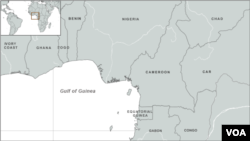Pirates have been active in the waters of West Africa’s Gulf of Guinea for many years. West Africa has some of the world’s most dangerous waterways.
Navies in the area have improved their ability to answer robberies on the ocean. However, pirates are changing tactics. They are abducting sailors and holding them for ransom.
The International Maritime Bureau reports on crimes at sea. It recently said two of three ship hijackings reported around the world in the first three months of 2015 took place in the Gulf of Guinea.
Pirates have kidnapped 44 sailors in the Gulf of Guinea this year. Although piracy is decreasing worldwide, the IMB says it is increasing in West Africa.
In its yearly security report, anti-piracy group Oceans Beyond Piracy says pirates in the Gulf of Guinea are increasingly taking hostages. Matthew Walje is the lead author of the report. He says hostages are often taken to Nigeria’s Niger Delta area and held there until ransom is paid.
That is a change from past years, he says. Pirates used to steal ships’ cargos and fuel. Walje says one reason for the change is that taking cargo takes too much time. Navies in the area have improved their ability to deal with ship hijackings.
“The time that it takes means that it is more likely to be interdicted, which then reduces the possibility of success.”
Kidnapping sailors, he says, appears to be faster and less risky for the pirates.
“It takes a little bit longer from start to finish, but the actual incident itself is shorter, and the likelihood of success is higher.”
Hostage taking, however, involves more violence. Last year, 23 people were killed in incidents of piracy in the Gulf of Guinea.
Walje says that navies are getting better at dealing with piracy. He gave the example of an incident last February when the navies of Ghana, Togo and Nigeria tracked a hijacked ship off their coasts.
The ship was eventually raided, and most of the sailors rescued by the Nigerian navy.
“The response is getting better and this may be a temporary uptick.”
Walje said a long-term solution to the issue would be for governments to do more to prosecute arrested pirates.
I’m Mario Ritter.
Chris Stein reported this story for VOA Learning English from Lagos. Mario Ritter adapted it for VOA Learning English. George Grow was the editor.
What do you think about piracy? Please leave us a comment, and post on our Facebook page, thank you!
______________________________________________________________
Words in This Story
pirate – n. someone who attacks and steals from ships at sea
tactics – n. methods leading to a goal
abduct – v. to seize or take someone against their will
ransom – n. money demanded for the release of a person being held captive or kidnapped
interdict – v. to isolate, to cut off from others
track – v. to follow as in a hunt
uptick – n. an increase








